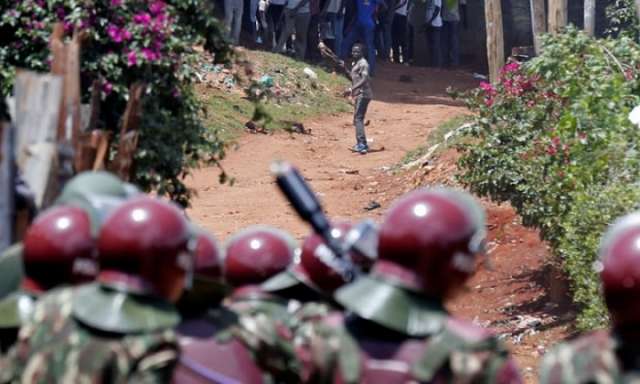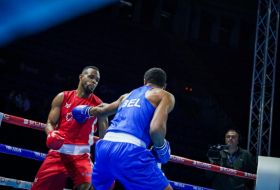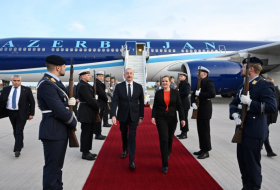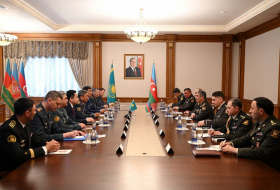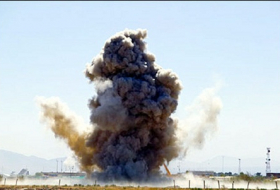Although votes are still being counted in the poll, local media have put Uhuru Kenyatta, the incumbent, ahead, winning 98 per cent of ballots cast.
The opposition, led by Raila Odinga, boycotted the election, which was marred by violent protests in the country’s western region, an opposition stronghold, and in Nairobi’s volatile slum neighbourhoods.
Analysts say only a deal between the two men could end the political crisis and avert much broader conflict.
“The longer this drags on the more bellicose the rhetoric gets among politicians and the more animosity there is among rising ethnic identities,” said Murithi Mutiga, an expert with the International Crisis Group in Nairobi.
In 2007, more than a thousand people were killed in ethnic violence following elections which Odinga also claimed had been rigged.
Kenya is a patchwork of different ethnic communities and groups. There has long been simmering resentment between those that are more influential – such as the Kikuyu – and those that see themselves as marginalised – such as the Luo or the Luhya. Kenyatta, 55, is a Kikuyu. Odinga, 72, is a Luo.
“It is true that we have not seen neighbour turning on neighbour but what we saw in [parts of Nairobi] on Friday night was close.
“There is a new constitution and vast improvements since 2007 but it is not a big leap to imagine that you could quickly go back to the old days,” Mutiga said.
Police were deployed to the poor neighbourhood of Kawangware early on Friday evening to disperse opposition protesters. Fighting during the night involved gangs armed with machetes, clubs and firearms. Several businesses were burnt down and at least three people died.
Residents of Kawangware and police officers said the clashes had pitted two local communities – Kikuyu and mainly Luo – against each other. Members of each group accused the other of calling reinforcements from elsewhere.
One casualty was Boniface Mutiga, who was hit outside his home of wood and corrugated iron by a stray bullet.
“It was chaos. We were frightened for our lives,” said Tabitha Tiemo, 31, a neighbour.
In areas on the outskirts of Nairobi, leaflets have been circulated warning members of specific ethnic communities to leave their homes “due to the destruction of our properties by [opposition] supporters”.
In Kibera, another poor neighbourhood which is an opposition stronghold, and where violent protests also flared last week, mediators supported by Mercy Corps, an American charity, are attempting to bring leaders from both sides in the conflict together.
“We tell them there is no alternative to peace. Just anarchy, and then everyone loses everything” said Caleb Wanga, coordinator of the project.
The increasingly chaotic political drama in Kenya began when the supreme court overturned Kenyatta’s victory in the 8 August election. It cited irregularities and mismanagement by the electoral commission. The turnout for that poll was 80%.
Odinga then withdrew from the rerun election, saying he believed it would be marred by the same flaws as the August vote. The low proportion of voters who turned out for the rerun – possibly only 35% – will undermine the credibility of any mandate Kenyatta may claim and will be seen as a victory by the opposition.
So far this year, between 50 and 70 people have died in election-related violence. “From past experience, sporadic incidents of violence quickly burst into a conflagration with tragic consequences. We are likely to go this direction unless quick action is taken,” a leading article in the Daily Nation newspaper said.
A second newspaper, the Standard, spoke of “60 days of acrimony, threats, accusations and counter-accusations that have threatened the very foundation of our country”.
In some areas, especially in the western Nyanza region where most of the deaths occurred, the election could not take place at all after opposition supporters prevented hundreds of polling stations from opening.
Plans to restage elections in the region on Saturday were again delayed after the election chief Wafula Chebukati said he feared for the safety of his staff.
Odinga has vowed to wage a campaign of “civil disobedience” and is demanding another election be held within 90 days. He has said he will issue further instructions to supporterson Monday. Last week Kenyatta said Kenya faced “a problem of tribalism” which was “an issue that we must … fight with as we continue to develop our country.”
Opposition MPs on Friday accused the government of conducting a “genocidal pogrom”.
“Categorically genocide is what Kenyatta is doing. It is an ethnically motivated plot,” Millie Odhiambo, an MP known for her uncompromising views, told the Observer. In Mathare north, a third major poor neighbourhood in Nairobi, one family is in mourning after violent protests last week. Paul Omena, a 29-year-old vegetable seller, died instantly when he was shot in the head on election day.
On Saturday his 24-year-old widow, Dorothy, and two small children were being comforted by neighbours and relatives in the family’s single rented room on the fifth-floor of a run-down, over crowded tenement in the slum.
“If there was no rerun, no election, nothing like this would have happened. It is very difficult,” said Grace Achieng, 26, the widow’s sister. “We are just hoping that the politicians will sort everything out and then we can go back to our normal lives.”
More about: #Kenya








